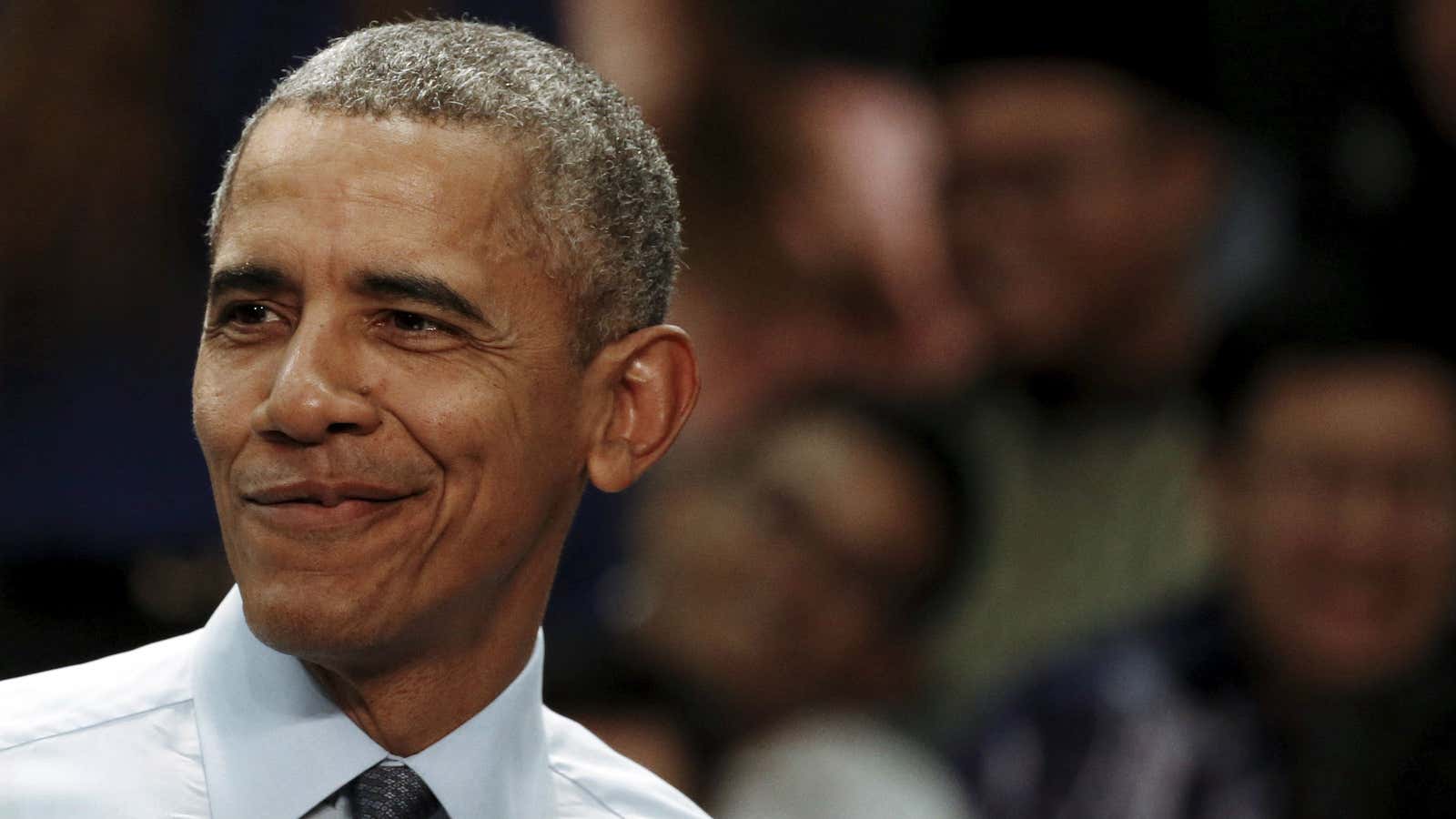Republicans seem so focused on the 2016 presidential election that they’ve forgotten Barack Obama won the 2012 election and is still, in fact, president. When news broke that conservative Supreme Court Justice Antonin Scalia died over the weekend, Republican Senate Majority Leader Mitch McConnell almost immediately declared, “The American people should have a voice in the selection of their next Supreme Court Justice. Therefore, this vacancy should not be filled until we have a new President.”
But the American people already did have a say, Mitch McConnell and his party just didn’t like it. So they’re going to make the unprecedented argument that the duly-elected President of the United States of America should ignore his Constitutional responsibility and just sit on his hands until the next president is elected? This is just beyond the pale.
Having ground Congress to a halt and done everything they can to constantly undermine and demean the legitimate authority of the Executive Branch, Republicans now seem determined to obstruct the workings of the third branch of our government, too.
Article II, Section 2 of our Constitution reads: “Power to nominate the Justices is vested in the President of the United States, and appointments are made with the advice and consent of the Senate.” Last we all checked, President Obama is the President of the United States. Appointing a Supreme Court justice is his privilege and responsibility.
Republicans, incidentally, are pointing to Robert Bork, Ronald Reagan’s Supreme Court nominee who Senate Democrats successfully blocked. But Democrats didn’t announce, hours after the vacancy was created and before any names were floated, that they would unanimously block any justice Reagan would nominate. Their opposition was specifically limited to Bork. And when Bork was blocked and Reagan nominated Anthony Kennedy, he was unanimously confirmed by the Senate. Today, Republicans haven’t declared their opposition to a specific candidate. They have declared their opposition to President Obama nominating anyone.
So what are President Obama’s options? Since he has said he will nominate a justice to fill the vacancy and not bow to this ridiculous Republican temper tantrum, my sense is he has two realistic options.
The first is to nominate a superstar moderate to fill the vacancy—someone it will be very politically hard for Republicans to oppose. Obviously it would have to be a candidate who checks all of the key boxes for Democrats in terms of safeguarding or even strengthening constitutional jurisprudence around abortion rights, marriage equality, common sense gun restrictions and other central issues. But otherwise, ideologically, it could be a Kennedy-lite if you will, someone who is not firmly in either the conservative or liberal wing of the court.
The problem is such a mythical unicorn of a Supreme Court nominee may not even exist. And politically pragmatic as President Obama is often inclined to be, remember he taught constitutional law and he understands the profound and lasting impact of whomever he appoints. And I suspect that while he may tactically lean toward compromise, on a matter as fundamental and permanent as this he’s not inclined to be conciliatory. That said, Republicans going apoplectic over an otherwise perfectly reasonable nominee—and in so doing, highlighting the GOP’s extremist views that are out of touch with the vast majority of voters—could play quite well for Democrats in the lead up to the election.
Obama’s second option is a recess appointment. It just so happens that the Senate is currently in recess until Feb. 22nd. While a Supreme Court ruling in 2014 constrained such appointments, the way Senate Republicans have taken this current break might make it possible for President Obama to legally make an appointment. (For more on the picayune legal details involved here, see SCOTUSblog.) Obama has strong wind at his sails to do this, with McConnell and others already declaring their blanket opposition to backing any nominee, and I’m not gonna lie, it would be a really powerful “Fuck you” gesture to make to a Republican Party that has been nothing but problematically petulant since Obama took office.
But Republicans have already smeared Obama for using executive authority when they’ve blocked legislative routes and the president might be reluctant to reinforce that characterization. Plus undoubtedly, one of the biggest factors for the White House is how any maneuver would help or hurt the eventual Democratic nominee for 2016. Though since such an appointment would be temporary anyway, and automatically expire at the end of this Congress, Obama could argue that he is in fact doing what Republicans want and appointing a placeholder until the next President.
Both of these options have benefits and risks. But what I think is most interesting is they mirror the sort of cognitive and tactical evolution of Obama’s presidency. For his first four or even six years in office, President Obama was deeply committed to and even convinced of his ability to navigate the unprecedented partisanship against him with compromise. More recently, finally recognizing Republican intransigence for what it is, Obama’s taken more of the “Fuck you” path.
As for who to nominate, I have no idea. Personally I’d like to see someone like Judith Browne Dianis or Vanita Gupta on the bench—thoughtful civil rights lawyers who would bring a depth of experience as practitioners to the court. Names that have been floated elsewhere include Sri Srinivasan, currently on the U.S. Court of Appeals for the D.C. Circuit, and Jane Kelly, currently on the 8th Circuit Court of Appeals. Both were previously unanimously confirmed by the Senate when Obama first nominated them to their current posts. Other options include former Massachusetts Governor Deval Patrick and Merrick Garland, chief judge in the DC Circuit who Republican Sen. Orrin Hatch once said would be confirmed to the high court “no question.”
The point is, there are plenty of outstanding candidates especially among the already-confirmed-once-by-Republicans crop of current federal justices. The question is how Obama wants to pick this fight.




